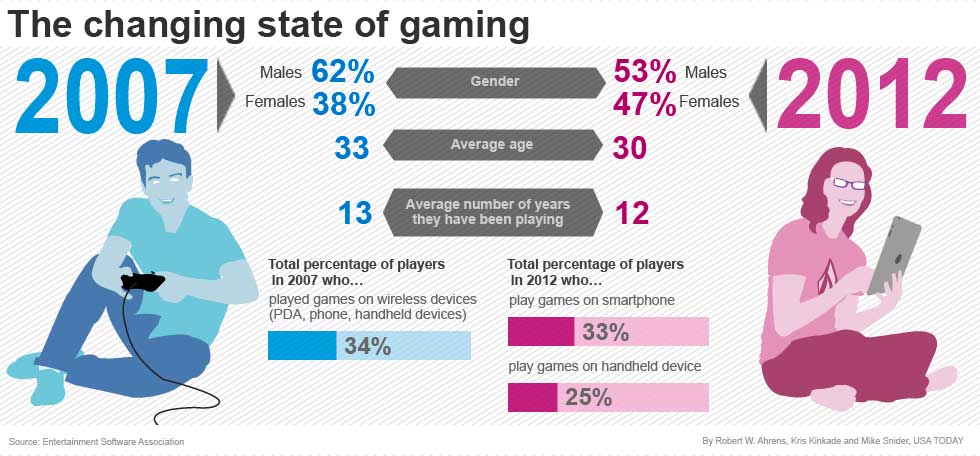The most important story for the game industry may not be what you saw at E3. Maybe it’s what you didn’t see– or rather, what you didn’t really notice. Like a black hole, it may best be detected by its invisible pull on its surroundings. On the surface E3 is all about consoles, the current ones and next-gen consoles arriving this fall, and to some extent about PC games (usually versions of console games). Look closer and a different picture begins to emerge amidst all the noise and visual clutter.
The massive and continuing growth of smartphones and tablets has resulted in enormous revenue from games on those platforms. In turn, that has lead to mobile games being developed by leading publishers like EA, although mobile games are still a small part of EA’s overall revenue. If you look closely you can see a number of mobile games being shown at E3, mostly in meeting rooms rather than the show floor. Some of them are from major publishers (like Blizzard’s upcoming tablet game Hearthstone: Heroes of Warcraft, or Zynga’s Solstice Arena), and others are from newer publishers (like Outfit 7’s Talking Friends series, celebrating 1 billion downloads). Mobile game publishers like King are even taking out booths at E3, the show supposedly about console games.

The interesting thing happens when you look closely at key new console games. Destiny, the game from Bungie that Activision is hoping will be an enormous franchise, has a mobile app that allows you to do important things in the game. EA’s FIFA is now deriving a lot of revenue from mobile apps that give you access to your teams. Sony is making old PlayStation games available on Android devices. Microsoft’s SmartGlass integrates tablets and smartphones into the Xbox and Xbox One experience.
From using mobile devices as controllers, to having mobile apps extending console gameplay, to mobile devices plugging into a TV to act as consoles, it’s clear that mobile devices are fundamentally changing the console game market. The influence is here, it’s growing, and companies that deny that mobile is important or that it affects the console business (and especially the handheld console business) are deluding themselves. Savvy companies are trying to figure out how to turn the continued success of mobile platforms to their advantage.

It’s not just gameplay that mobile is changing in the console business; it’s game marketing as well. The majority of Americans now have a smartphone, and it’s with them generally every waking minute. A smartphone is checked dozens or even hundreds of times in a day. What better place to contact an audience about your game The marketing potential in an intelligent device that already engages you multiple times a day is huge. Advertising and marketing on mobile are still evolving and changing, but it’s already an important marketing tool. New forms of marketing are being developed and tested, and the field is wide open for creative experiements.
It’s clear, though, that with all of this that mobile is exerting a huge influence on the gaming industry in every way, from marketing to game design to revenue. As the world continues to embrace mobile platforms, game companies and game marketers need to be prepared to do the same.

